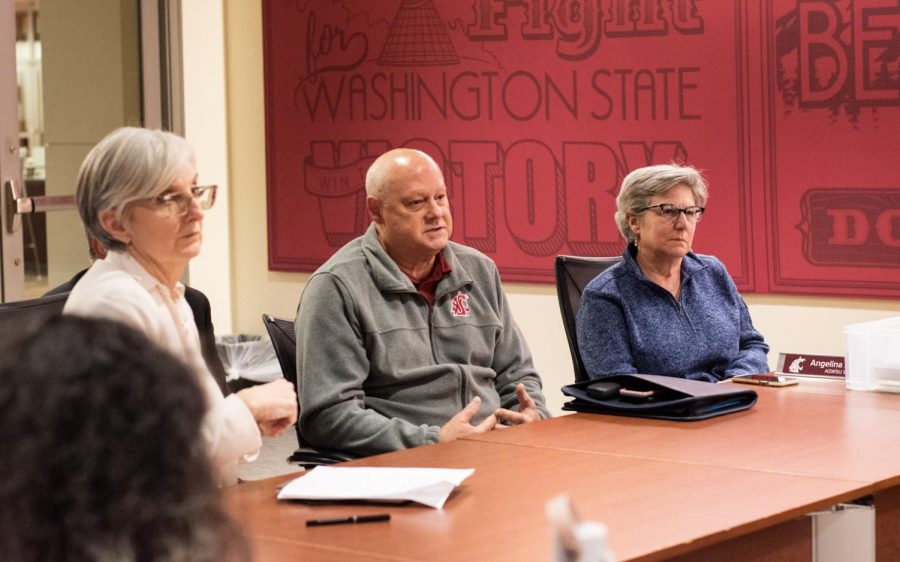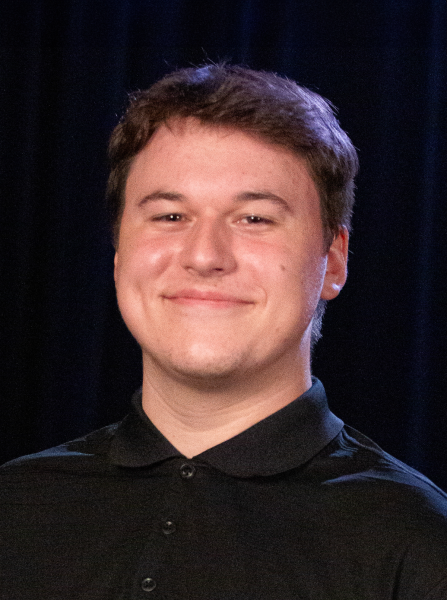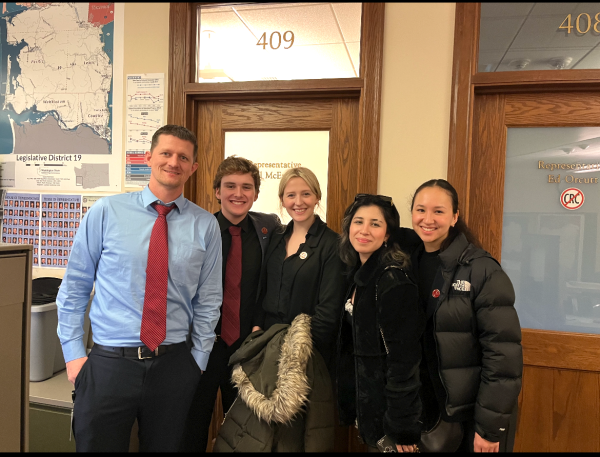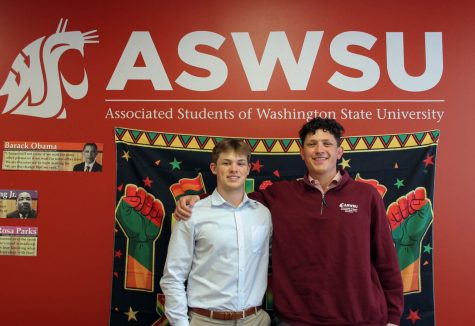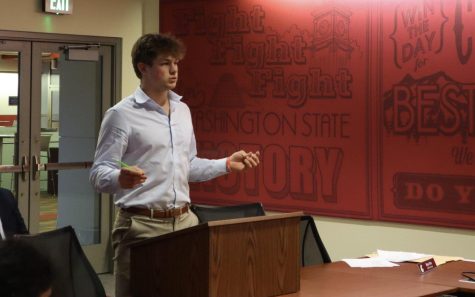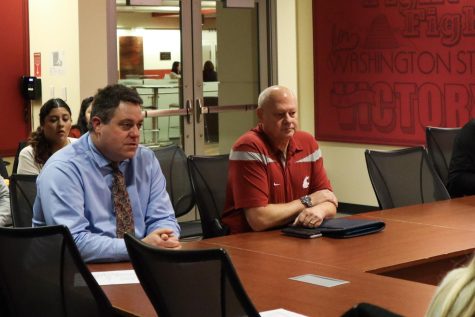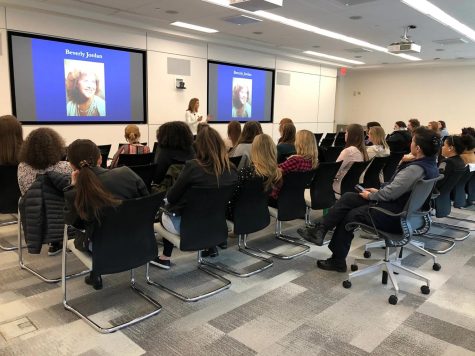ASWSU host Elizabeth Chilton at Senate meeting
Senate asked about student safety, emergency communications and mental health
Chancellor Elizabeth Chilton; WSU Police Chief Gary Jenkins; Phil Weiler, WSU vice president of marketing and communications and Ellen Taylor, Vice Chancellor for Student Affairs answered questions from senators on Feb. 22, 2023.
February 24, 2023
ASWSU hosted Chancellor Elizabeth Chilton; WSU Police Chief Gary Jenkins; Phil Weiler, WSU vice president of marketing and communications; and Ellen Taylor, Vice chancellor for Student Affairs, for a Q and A session Wednesday.Questions were mostly centered around student safety and mental health accessibility.
At the last meeting, it was announced that Chilton would be making an appearance in which she asked for questions in advance in order to prepare.
Pro-Tempore Tania Henriques asked the first question of the meeting, about what is being done for student safety both on-campus and in apartment land.
Jenkins said it is important to understand the difference in jurisdiction between WSU and Pullman Police Department, as anything off of WSU property is something that would be handled by Pullman.
However, Pullman PD and WSU PD are in close contact and communicate any potential threats that occur off campus, he said.
“We have put special attention to the Coug Safe Rides program, WSU police cadet corps offers a free on-foot escort to students and faculty on most evenings. We are also obviously trying to scale up bus transportation. We have the emergency blue light telephones on campus and are offering a new line of self-defense courses through the UREC,” Chilton said.
When asked if there is still an effort in place to maintain higher security forces on campus, Jenkins said that WSU PD is trying to maintain high visibility on campus as well as working on several things on campus in terms of increased security.
“We are looking to increase security cameras and door access controls on campus. Talking with the office of federal engagement, we are working on a plan for a congressionally directed appropriations request where we could get money from the federal government to improve security” he said.
Senator Gabrielle Lund asked about the police cadet escort and the efforts in place to get that service promoted, citing that she believes the majority of the student body is unaware of its existence.
Chilton said WSU’s offices can probably do a better job at utilizing social media and increasing their presence on social media. They will also do a better job augmenting the available resources for students and student safety.
Senator Sophia Flippin asked how and why WSU PD felt comfortable issuing a statement that our community was safe in the wake of the University of Idaho homicides when it was actually not.
Jenkins said WSU PD was following the information given by Moscow Police Department, which at the time the statement was sent out, was that there was no active threat to the community.
The murders occurred on Sunday, and Moscow PD did not have a press conference on the matter until Wednesday. As the Moscow PD Chief James Fry took questions from the media, he began to backpedal on that initial statement which led to some confusion on whether the community was actually safe, Weiler said.
“As soon as the news conference was over, we realized we needed to update our message,” he said.
Senator Cleofa Vargas asked about the types of precautions set in place in the event of a school shooting or an immediate emergency.
All WSU PD officers go through regular training on active shooters and how law enforcement should respond to those types of calls, Jenkins said.
“We train with the fire department so that we are able to clear an area and get medical aid in as quickly as possible. We debrief these types of incidents all the time so that we can make improvements based on what has happened previously,” he said.
WSU PD also offers training for students and staff on how to deal with these types of situations. The department will visit any student group or apartment complex that requests that training when that comes up, Jenkins said.
Vargas followed up on why these trainings are not required for all students and faculty to prepare for these situations.
“For some of our staff it is actually required. For example, Cougar Health Services does those trainings annually, student REC center also has it built into their annual training cycle,” Taylor said.
Taylor said that it is a tough dynamic as there are many people who do not want to do the training as it becomes very distressing. So requiring it comes with a lot of nuances to ensure that everyone has the support that they need, as well as the fact that WSU has a very large student body.
Multiple senate members asked questions about mental health resources that are available on campus, the possibility of expansion to the north side of campus as well as any potential that counselors could be assigned to specific resident halls.
Over the last 10 years, it has been a challenge to fill all of the openings in mental health facilities that the university has had the funding for, Taylor said.
When talking about potential expansion to the north side of campus, Taylor said it is a long process to find confidential space and staffing it, but they will continue to have those conversations and explore that idea.
As for residence halls, she said that at a previous university she worked at they tried that and what happened was that the counselors sat there with no one looking to see them while the main clinic had a wait list still.
“The general feedback from students was that they did not want to risk their friends in the dorm halls to see them entering or leaving the counselors office,” Taylor said.
To wrap things up, Senator Trevor Johnson asked if the university has any general plans that ASWSU can support them in.
Chilton said she and her team have been working on a “Pullman Strategic Plan,” which outlines short and long-term goals for WSU. Some of these goals include enriching the student experience both in and outside the classroom.
Enrollment is another huge goal for WSU across all systems and this strategic plan will hopefully help in recruitment efforts and “get some rubber on the road,” she said.
Sean Greene, associate vice chancellor for facilities and operations, will be joining the Senate meeting next Wednesday.

